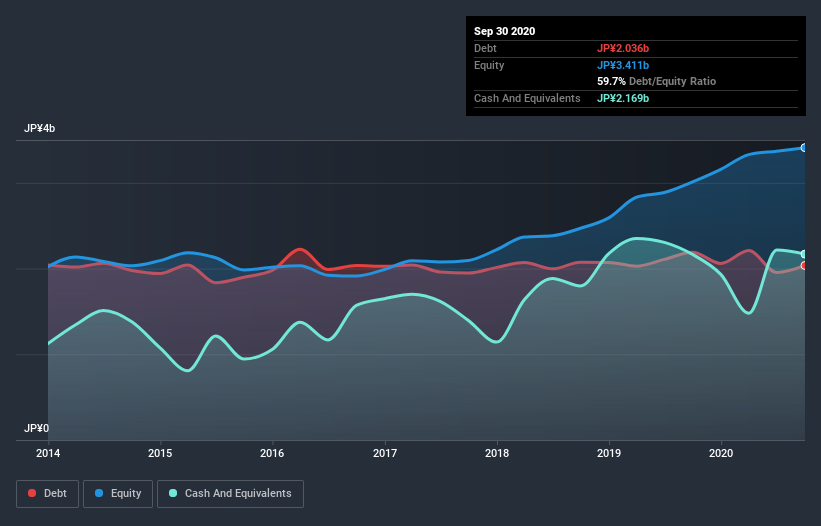
Howard Marks put it nicely when he said that, rather than worrying about share price volatility, 'The possibility of permanent loss is the risk I worry about... and every practical investor I know worries about.' So it seems the smart money knows that debt - which is usually involved in bankruptcies - is a very important factor, when you assess how risky a company is. We note that Saita Corporation (FKSE:1999) does have debt on its balance sheet. But is this debt a concern to shareholders?
Why Does Debt Bring Risk?
Generally speaking, debt only becomes a real problem when a company can't easily pay it off, either by raising capital or with its own cash flow. In the worst case scenario, a company can go bankrupt if it cannot pay its creditors. While that is not too common, we often do see indebted companies permanently diluting shareholders because lenders force them to raise capital at a distressed price. Of course, debt can be an important tool in businesses, particularly capital heavy businesses. When we examine debt levels, we first consider both cash and debt levels, together.
View our latest analysis for Saita
What Is Saita's Net Debt?
As you can see below, Saita had JP¥2.04b of debt at September 2020, down from JP¥2.19b a year prior. However, it does have JP¥2.17b in cash offsetting this, leading to net cash of JP¥134.0m.

How Healthy Is Saita's Balance Sheet?
We can see from the most recent balance sheet that Saita had liabilities of JP¥2.57b falling due within a year, and liabilities of JP¥627.0m due beyond that. On the other hand, it had cash of JP¥2.17b and JP¥1.11b worth of receivables due within a year. So it can boast JP¥80.0m more liquid assets than total liabilities.
This short term liquidity is a sign that Saita could probably pay off its debt with ease, as its balance sheet is far from stretched. Simply put, the fact that Saita has more cash than debt is arguably a good indication that it can manage its debt safely.
In fact Saita's saving grace is its low debt levels, because its EBIT has tanked 37% in the last twelve months. Falling earnings (if the trend continues) could eventually make even modest debt quite risky. When analysing debt levels, the balance sheet is the obvious place to start. But you can't view debt in total isolation; since Saita will need earnings to service that debt. So when considering debt, it's definitely worth looking at the earnings trend. Click here for an interactive snapshot.
But our final consideration is also important, because a company cannot pay debt with paper profits; it needs cold hard cash. While Saita has net cash on its balance sheet, it's still worth taking a look at its ability to convert earnings before interest and tax (EBIT) to free cash flow, to help us understand how quickly it is building (or eroding) that cash balance. Looking at the most recent three years, Saita recorded free cash flow of 38% of its EBIT, which is weaker than we'd expect. That weak cash conversion makes it more difficult to handle indebtedness.
Summing up
While we empathize with investors who find debt concerning, you should keep in mind that Saita has net cash of JP¥134.0m, as well as more liquid assets than liabilities. So we are not troubled with Saita's debt use. When analysing debt levels, the balance sheet is the obvious place to start. However, not all investment risk resides within the balance sheet - far from it. Be aware that Saita is showing 2 warning signs in our investment analysis , you should know about...
If you're interested in investing in businesses that can grow profits without the burden of debt, then check out this free list of growing businesses that have net cash on the balance sheet.
When trading Saita or any other investment, use the platform considered by many to be the Professional's Gateway to the Worlds Market, Interactive Brokers. You get the lowest-cost* trading on stocks, options, futures, forex, bonds and funds worldwide from a single integrated account. Promoted
New: Manage All Your Stock Portfolios in One Place
We've created the ultimate portfolio companion for stock investors, and it's free.
• Connect an unlimited number of Portfolios and see your total in one currency
• Be alerted to new Warning Signs or Risks via email or mobile
• Track the Fair Value of your stocks
This article by Simply Wall St is general in nature. It does not constitute a recommendation to buy or sell any stock, and does not take account of your objectives, or your financial situation. We aim to bring you long-term focused analysis driven by fundamental data. Note that our analysis may not factor in the latest price-sensitive company announcements or qualitative material. Simply Wall St has no position in any stocks mentioned.
*Interactive Brokers Rated Lowest Cost Broker by StockBrokers.com Annual Online Review 2020
Have feedback on this article? Concerned about the content? Get in touch with us directly. Alternatively, email editorial-team (at) simplywallst.com.
About FKSE:1999
Flawless balance sheet, good value and pays a dividend.
Market Insights
Community Narratives




